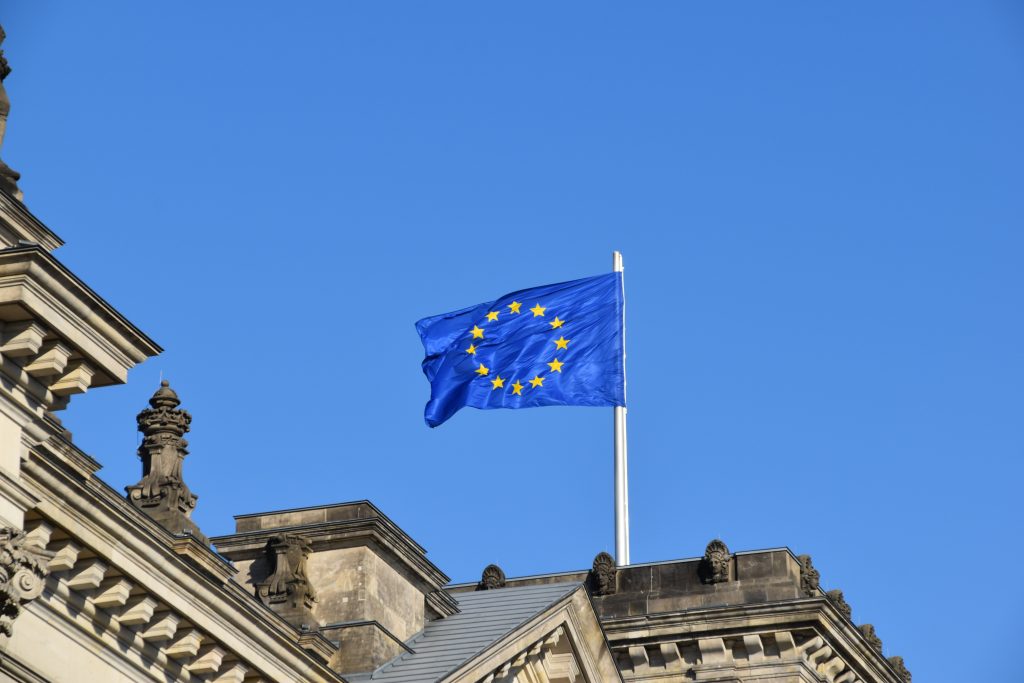Europe’s third way
This report recap is part of the AI & China: Smart Partnerships for Global Challenges project, focused on data and AI. The Atlantic Council GeoTech Center produces events, pioneers efforts, and promotes educational activities on the Future of Work, Data, Trust, Space, and Health to inform leaders across sectors. We do this by:
- Identifying public and private sector choices affecting the use of new technologies and data that explicitly benefit people, prosperity, and peace.
- Recommending positive paths forward to help markets and societies adapt in light of technology- and data-induced changes.
- Determining priorities for future investment and cooperation between public and private sector entities seeking to develop new technologies and data initiatives specifically for global benefit.
@acgeotech: Championing positive paths forward that nations, economies, and societies can pursue to ensure new technologies and data empower people, prosperity, and peace.
Summary of the Brussels Roundtable on China & AI — October 16, 2019
Modern technologies are developing at an exponential pace, and the discussion about their use as well as their implications for society and international relations is shaped by uncertainty. To shed light on the subject matter and to engage relevant stakeholders in necessary conversations, the Atlantic Council’s Foresight, Strategy, and Risks Initiative was awarded a Rockefeller Foundation grant that helped lay the groundwork for a new GeoTech Center. The publication of reports and the organization of conferences around the world were subsequent tasks, and endeavors started with the first roundtable in Paris on September 16-17, 2019. On-site, participants had the opportunity to exchange views, consult about disagreements, and map out paths towards potential cooperation.
The second meeting of the series took place in Brussels on October 16, 2019 and was co-hosted by the European Parliamentary Research Service (EPRS). The majority of the roughly two dozen participants in the conference were EU officials drawn from the Council, Commission, and Parliament, as well as European business representatives and several US and Chinese experts. From Europe’s position and capacity in the global AI race to the future of US-European relations in light of China’s AI push, the agenda was similar to the one in Paris and participants discussed China’s role as a global citizen, the country’s use and development of artificial intelligence, and the implications of emerging technologies for international relations. The meeting was held under strict Chatham House Rules, which is why the subsequent summary captures key ideas and proposals made during the discussion, but does not include any personal attributions.

From the very beginning of the roundtable, it became clear that the Peoples Republic of China (PRC) is a complex partner for the European Union and “cannot be put in a single box.” According to one participant from the European External Actions Service (EEAS), there are areas of cooperation as well as competition, and sometimes even confrontation. Others suggested that Europe would be well advised to take a longer view on China, given the fact that the country will become the largest economic power in the world, rather sooner than later. One EU bureaucrat put forward the notion of a so-called three “M-approach” when dealing with the PRC: “Multilateral, non-militaristic, and machiavellian.” He continued by saying that Europe neither has the same amount of data nor the same amount of investments than China does, but it has the GDPR, which is certainly an area where the EU can leverage its strength — a reference that reoccurred throughout the conversation, presaging Europe’s effort to carve out a Third Way approach when it comes to emerging tech.
By quoting EU Commissioner Margrethe Vestager, who allegedly said that China has all the data, the United States all the money, but Europe all the purpose, representatives from the EPRS pointed to Europe’s role as a trend setter, using its market size to force the adoption of privacy and data regulations. “The EU, most certainly, has some areas where it can leverage its strengths and there is something like a ‘European approach’ to emerging technologies. The GDPR, for instance, is something very good, and it sets an extremely high standard around the world. If we are ethical, we might have a better chance of establishing an equitable market, because consumers ultimately want to be protected. An economy should ultimately be about the people,” one member from the EU Commission explained. And while there was agreement in the room that Europe’s strengths rest on expertise and infrastructure (people, universities, regulations etc.), participants were less sure on how the EU can build effectively on these strong points. Even though many agreed that there is in fact a ‘third way’ approach that is different from the Chinese (state focus) and the American (company focus) model, others warned that taking the ethical dimension into account is a very complex endeavor, because it is influenced by a cultural dimension and might make agreements on the international level all the more difficult, especially when dealing with China.
Worry about Europe’s Industrial Sector
One participant from the EPRS highlighted the dire need for a new industrial strategy, “especially when it comes to the broader application of industrial data.” He explained that threats to the European manufacturing sector are multifaceted and worried, in agreement with other discussants, that further automation and the development of applicable artificial intelligence will eliminate large swaths of professions, previously conducted by humans — with potentially devastating social consequences, including slowing social mobility, decreasing economic opportunities, and degrading what it means to be middle class. Further wealth polarization between the rich and the rest of society as well as stagnating wages for the bulk of the middle and working classes might lead to surging populism and social turmoil, ultimately threatening liberal democracy. “I don’t know whether there is an economic model in place that can deal with the negative consequences of automation, artificial intelligence, and other new technologies. I doubt that societies and countries are prepared for what’s coming,” one participant feared. Others suggested to change education systems and revise social programs in order to counter negative social effects that might come with emerging technologies.
Furthermore, China’s ability to collect industrial data poses an equal threat to industries and respective countries in Europe. One speaker noted that “China’s manufacturing economy, in combination with AI, presents a great threat to Europe’s manufacturing businesses, especially since the collection of data in Europe is more difficult however necessary for sufficient developments of artificial intelligence.” That dilemma points to an important question: How can Europe ensure the collection of data — needed for a burgeoning manufacturing and thriving technology base — “if it follows the privacy/policy standards it is so proud of in the first place?” Trying to square the cycle, one discussant suggested that current circumstances are very different than they were during the industrial age. “Rather than investing in laboratories and/or innovation, it is now indeed more about the collection and application of data. We need to bring together European countries and encourage them to invest in these specific areas. Companies must be able to train AI systems, so economies which are already strong can be even more powerful, […] having the resources to collect and apply data.” Turning to the international stage, he continued by stating that there has just been a treaty signed with Japan, “that enables the flow of data in a sophisticated manner. China, on the other hand, is a ‘systemic rival’ which makes agreements with it rather difficult. However, it is important to always have a playing field with the PRC. It is essential that the EU finally wakes up to the China challenge and stops being so naive. Europe sees the Belt and Road initiative as a complementary way, instead of a competitive method — contrary to US views. In some areas, there is opportunity for cooperation, indeed, but collaboration needs to happen on a set of predefined values in order to guarantee a fair playing field.”

A Lack of European Unity
In devising rules that potentially govern AI in the future, participants were divided over how much of the Chinese perspective should be taken into account. Some suggested that Europe should look at the PRC with more cooperative lenses, understanding that the relationship should be a healthy competition that doesn’t create only losers. “There is often a discussion about American and European values when it comes to AI, but what about taking the Chinese perspective into account, including their ideas and values? We can, if we want to, create win-win situations.” Others were more critical and urged caution, highlighting the importance of democratic and liberal values. “We infuse technology with values all the time, which obviously leads to systematic problems when it comes to China.” The divergence of opinions on the subject matter smacked of a larger problem, namely the lack of European unity when it comes to a consistent China and AI policy.
Representatives from the European Council admitted that there is not really a common EU position on China, given the variety and diversification of 27 member-states’ policies. “But the 5G discussion can serve as a good example when Europe is able to push back against the United States. What truly matters is the relevance and reliability question. Certainly, China is relevant, but is it also a reliable partner? We have been talking about an investment agreement for over five years, but it hasn’t happened. I don’t think that the 16+1 framework is a particularly good example for cooperation.” While participants agreed that creating overlapping markets will be key to develop a third, European way, some questioned whether there is enough political will for cooperation in the first place. “If we advocate for international and European cooperation, how much political will is there for collaboration in general? National sovereignty should be understood as the concept of shared sovereignty. When we talk about collaborators working with Europe, we need to find those willing to partner first.”
Becoming united on these questions about how to deal with emerging technologies and China are doubly important, considering the seemingly unstoppable trend towards great power competition in the field of AI. Statements as well as actual policies have made it abundantly clear that staying ahead in the tech field is of high priority for the US administration and seems to have become a matter of national security, making international cooperation on emerging technologies all the more difficult. But this situation should give Europe a special role, as one participant explained. “With the US obsession about great power competition, the EU is playing a pivotal role in international relations. Does it want to follow the United States, or mediate between China and the US?” The expert continued by alluding to Europe’s geographical and cultural proximity to the PRC: “Europe can help the United States and China get along and maybe to understand each other better.” He thought that the Chinese version of legitimacy and social order is often misunderstood in the West and, especially, fuels US distrust. “Too often, the United States dismisses China because it is not a Western-style democracy.”
Representatives from the private sector challenged the entire “race” terminology, as “quite problematic, since AI is not about production etc. The same complexity also makes the concept of sovereignty very difficult. Can there be a multilateral approach? Yes, there has to be! The so called ‘winner’, geopolitically speaking, will be the country who applies AI most effectively. The international aspect of the scientific community is very important for companies, because diversity is essential for developing an unbiased type of machine learning.”
Old Friends and New Partners
Irritated by the ‘America first’ logic, European bureaucrats highlighted that the EU shares many of the American concerns about Chinese property theft, the lack of access to the country’s market, and unfair trade practices. However, the vast majority of participants indicated that a confrontational approach is something they oppose, given the significant importance of the Chinese market for European companies. One participant suggested a “global partnership on AI within the realm of the G7 that one day could also include China. The OECD is very supportive of this approach, and so is the new EU Commission.” He continued by saying that the debate about international cooperation with China is getting warmer as well, but EU policy formulation is always a rather difficult endeavor because of the diversity of viewpoints among member-states.
Asked about how a European third way model would operate, opinions diverged slightly, though all highlighted the consumer-driven approach. “Is the third, European way something that is realistic or wishful thinking? It might look unrealistic now, but with regard to the future, things will change. At the moment, people are giving their data away without thinking about the potential costs, but such an attitude might change.” Another participant wasn’t sure whether Europe has the necessary power to regulate AI efficiently. “Europe might need [big tech] champions in order to play a sufficient role, especially when looking at the Chinese and the Americans.”
The roundtable ended by discussants looking at the security aspect of artificial intelligence. A US representative said that “the Department of Defense, for instance, is trying to always keep a human in the decision loop so that unintended consequences can be avoided. A policy that, from a military perspective, is crucial when talking about cooperation with China, where there is a big lack of transparency and privacy.” Furthermore, many were critical of the public’s lack of understanding of modern technologies and worried about the consequences. “We are lacking education, and regulation only works if people are educated enough to understand it, which is essential for the success of Europe’s third way.” Rather worrisome was the notion that Europe, in general, questions old alliances and seems to look for trusted technology partners it can cooperate with. “The EU Commission has done a lot to catch up, but more needs to be done in order to ensure our sovereignty, enabling us to escape the constant dilemma of dependency that we were trapped in for too long.”
The meeting in Brussels was part of the Atlantic Council’s ongoing endeavor to establish forums, enable discussions about opportunities and challenges of modern technologies, and evaluate their implications for society as well as international relations — efforts that are championed by the newly established GeoTech Center. Prior to its formation and to help lay the groundwork for the launch of the Center in March 2020, the Atlantic Council’s Foresight, Strategy, and Risks Initiative was awarded a Rockefeller Foundation grant to evaluate China’s role as a global citizen and the country’s use of AI as a development tool. The work that the grant commissioned the Atlantic Council to do focused on data and AI efforts by China around the world, included the publication of reports, and the organization of conferences in Europe, China, Africa, and India. At these gatherings, international participants evaluate how AI and the collection of data will influence their societies, and how countries can successfully collaborate on emerging technologies, while putting a special emphasis on the People’s Republic in an ever-changing world. Meetings in Africa and India are scheduled to take place later this year and summaries of the roundtables in Paris, Berlin, Beijing, and Shanghai have been published.

The GeoTech Center champions positive paths forward that societies can pursue to ensure new technologies and data empower people, prosperity, and peace.

